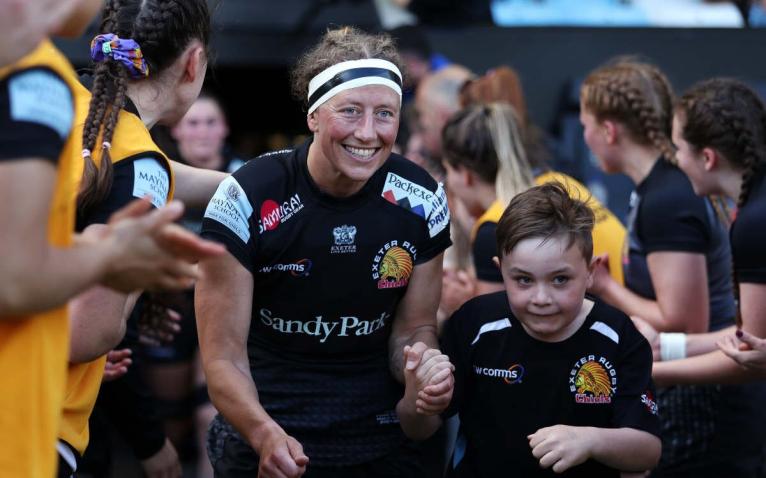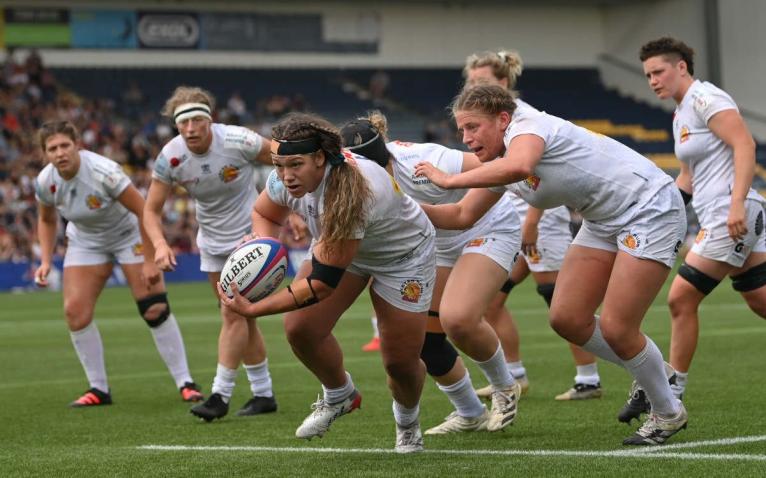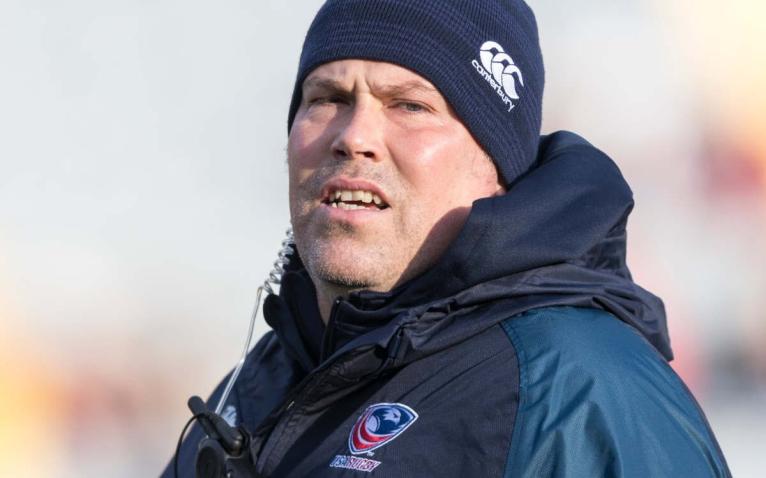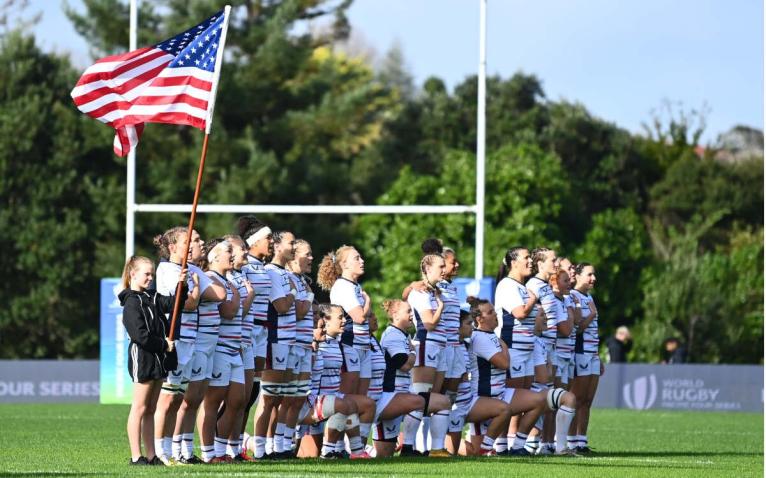It’s November 2021, and the USA have been demolished by the best team on the planet. Bagelled in Worcester – with just a year until the World Cup. England 89 – USA 0.
Fast-forward six months, at the Allianz Premier 15s final, and seven of the starting 30 are Eagles. They have soared in the strongest women’s domestic league this season: integral cogs in a pair of history-making sides. Saracens 43-21 Exeter Chiefs.
On a blustery September day at Sandy Park, the Eagles, weeks out from the biggest championship in the sport, have rattled the Roses. They lose the second half by just five points, and both the growth achieved and the growth to come are evident. The chasm has become a gap; Red Roses 52-14 Eagles.
The USA are a dominant force in sport, if not the dominant force in sport. Their collegiate system is peerless, they cultivate personalities and fandoms spanning the globe, and a disproportionate number of the flags hoisted at Olympic medal ceremonies bear the stars and stripes. Rugby’s spark, however, has taken a while to truly ignite. Their women won the first World Cup back in 1991, but as the game’s profile and competitiveness has rocketed elsewhere, the side have routinely looked moribund, unkempt and off the pace. It is stark that they haven’t registered a podium finish this millennium.
In 2019, 28 England players were awarded full-time contracts. With that, the tectonic plates of women’s rugby shifted, and an on-going game of ‘catch us if you can’ begun. A year previously, the US had taken a major contractual step of their own. They snapped up Rob Cain, the Englishman who’d guided Saracens to the inaugural Premier 15s title and announced him as their first full-time head coach. A jump-start, if you like. A sleeping giant was given a firm nudge.
‘It was 50/50, I suppose. If you’re a successful coach, people are always interested’, Cain offers, when asked who courted who. ‘What I did at Saracens was there for everyone to see, and I’m very proud of that. I was interested in the US role for the same reasons I enjoyed Saracens: they hadn’t been successful for a large period of time but you could see the massive potential, and I really enjoy building things.’ The possibilities were immediately apparent, despite the delays his idiosyncratic British sense of humour encountered crossing US border patrol: “sarcasm took a while to land, but, as the girls say, ‘they’ve got plenty of sass, and give as good as they get…’”

Chatting to the amiable coach on Zoom, he sits back and blows his cheeks out when asked what his first impressions are. “I think the thing that struck me most was just how many good people were involved, and how coachable players there were. Elements of that we needed to work through. In American culture, coach is very much king, but my philosophy is that you need to empower people to make decisions. Ultimately, they’re the ones playing the game. I’ve learned a lot, the good and the bad, and their baptism of fire has been a lot harsher than mine! Many of them hadn’t played much international rugby, so it took them a while to find their feet, and to really understand what their identity was – not just who they are, but who they could be.’
There are fewer more hostile environments in which to find your feet than a pitch shared with the Black Ferns – but Cain, undaunted, handed debuts to 13 players in his first outing in charge. The scoreline in Chicago wasn’t pretty – 67-6 – but he’d tested both individuals and squad depth against the world champions.
As athletic as these girls are, the true nature of that doesn’t really get seen until you can translate it into rugby: identifying what space is, understanding what’s a priority and by proxy what’s not a priority.
Rob Cain, USA Eagles head coach
Captain that afternoon was Kate Zackary. The Exeter Chief has been a constant over Cain’s tenure – despite only happening upon rugby a few years before his appointment. In her own words, it was a ‘Cinderella story, ‘I didn’t go through the normal pathways’. The collegiate soccer star attended a local session with friends and was suddenly attending a National 7s camp. By the time Cain arrived, she’d competed in two World Cups, and was fast establishing herself as one of the most complete No 8s in the game. Omnipresent and omnipotent – Zackary is famed for her monstrous hits, stripping possession, and leaving stricken defenders in her wake en-route to YouTube friendly-scores. Indeed, her highlights reel is matinee length, and her stats look like typos.
The Eagles squad is full of these compelling narratives and a kaleidoscope of pathways into the game; from state powerlifting champion Nick James to Charli Jacoby, who was scouted whilst cheerleading. Eti Haungatau, whose family is littered with Olympic 7s athletes is an anomaly within a national rugby squad from a non-rugby nation. Cain has said in the past that it’s ‘scary’ how good some of his team could get simply with more playing the game. “As athletic as these girls are, the true nature of that doesn’t really get seen until you can translate it into rugby: identifying what space is, understanding what’s a priority and by proxy what’s not a priority, and then playing what’s in front of you. They’re now becoming really good rugby players – and, the further we go down that road, the more you’ll see those points of difference.’

Hope Rogers, despite being four years Zackary’s junior, had been capped as a prodigious teenager before her skipper had even picked up an egg-shaped ball. This beaming, bounding prop discovered the game during ‘a pretty tough time personally’, and fell in love. “There were times when I felt very alone… and then I found rugby – or rugby found me. It forces you to be present: your team are relying on you to focus on your job in that game – rather than anything going on elsewhere in life. It was immediately a safehaven, and I met the people I consider my family through it.”
Rogers has gone on to make a telling impact on the US set-up – 37 caps spanning two World Cups – just as Maggie Alphonsi did right at the start of her career. “One of my first big contacts was against Maggie. I was 20-years-old running with the ball and we collided.” Rogers claps her hands for affect, “I was like ouch. Welcome to international rugby…”’
Fast forward a decade, and Alphonsi is singing Rogers’ praises live on ITV – marking the Exeter Chiefs star as her ‘one to watch’ ahead of a World Cup warm-up.
While the Eagles have talent in abundance, exposure was in short supply – especially when Covid struck, as rugby in the States ground to a halt. Cain and co. were forced to get creative. Where were the world’s top players? And where was the best rugby taking place on a regular basis? In one of the great sporting migrations of recent times, more than 20 Eagles flew across the pond and into the Premier 15s – where they’ve sparkled. Exeter – brimming with transatlantic stars – won the inaugural Allianz Cup in emphatic style and became the first side other than Saracens or Harlequins to reach the league’s final. Saracens, captained by Lotte Clapp, acquired Alev Kelter midway through the season, whose sensational all-court game propelled them towards a historic third title.
I didn’t really know what I was walking into. It was an opportunity to face off against some of the best in the world and I think I surprised myself, to be honest, at how well some games went
Kate Zachary, on her experience with Exeter Chiefs
‘I didn’t really know what I was walking into’, Zackary admits. “It was an opportunity to face off against some of the best in the world and I think I surprised myself, to be honest, at how well some games went. That made the second year that much harder – having to consistently perform to the standards people expected of me but that’s motivation in itself, and the second year was really, really big for Exeter. Not just making it to a final but having so many individuals step up and receive recognition. It speaks volumes about what it means to play rugby week in, week out.’
For Rogers, with whom Zackary packed down round after round over the course of that historic Chiefs season, it was transformative. “The amount I’ve learned about line-outs, mauls, and scrums is enormous, even though I’d been playing international rugby for nine years already, and that’s why I want to go back next season. I feel it in my joints but in holistic terms, this is some of the best rugby I’ve played. I want to see the player I can actually become, so it’s worth the aches and pains ten times over.’

‘It’ – the sacrifice at the heart of this transatlantic odyssey – is substantial. Both Zackary and Rogers had to leave long term partners (and, in Rogers’ case, a puppy) behind, and Zackary has missed much of watching her nieces and nephews growing up. She’s not made it back for family Christmas for two years now and suspects she’ll be absent again in 2022.
‘The decision was very hard’, muses Rogers. The Pennsylvanian had her first offers to play in the UK back in 2015 but was reluctant to take the plunge. “I know I seem really outgoing, but I’m a pretty shy person, so it was a big decision. Then, when I saw a bunch of people from the US heading over and enjoying it – I knew that to be the kind of player I wanted to be at this World Cup, I had to join them. I’m very blessed: my husband is so supportive of me and my dreams but it’s really hard to be distanced for that long. I don’t like to use the word ‘sacrifice’ because, as athletes, we do what we have to do. It’s a choice we make, and what I’ve gained is immense.’
Cain helps his players connect with Premier 15s clubs, arranges weekly one-on-one video calls, and visits them for skill and unit development sessions – all whilst battling to secure full-time contracts and a robust Eagles infrastructure. He does the same with his athletes within the Women’s Premier League in the States, and painstakingly trawls the country for new talent and opportunities to grow the game.
The exciting thing is that we didn’t really reveal a lot in the Scotland or England games, so we can show a bit more when we get to the pool stages
Rob Cain
It sounds exhausting, but his tone throughout is upbeat and enthusiastic: he clearly loves his role, and wholeheartedly believes that the best is yet to come. One day, the full-time camp he’s speaking to RugbyPass+ from might become the norm – rather than a World Cup-year luxury:
“It’s been an eye-opener for some of the players: they’re getting challenged at a much higher level. International rugby should be a step ahead of club environments, and – even with our limited budget and resources – we know we’ve provided that. People have found their feet, found their voice, and found their identity. Now it’s just about refining that. The exciting thing is that we didn’t really reveal a lot in the Scotland or England games, so we can show a bit more when we get to the pool stages.”
‘England is the prime example of what it means to invest in a women’s team,’ Rogers observes. ‘If you look at the countries who truly invest, they’re at the top right now. We’re showing that, with very little, we can do a lot. We have the personnel – our country’s big enough – so it’s just about investing and building a good structure.’
Poor on contracts – for now – but rich in team culture, rather than have US legends or coaches conduct their jersey presentations, they hand one another their shirts, ‘because we’re the ones who have each other’s backs’, Rogers explains. ‘It’s not the coaches or somebody else out there – it’s us – so it’s more special to receive your jersey from a teammate than anyone else.’

And then, come game day, these bonds truly become apparent. The Eagles faced Scotland earlier this month, and – as each of the 23 emerged to warm-up – they were greeted by the whoops and hollers of wider squad members. ‘Yeah, Hallie!’, ‘Let’s go, Kate!’, ‘You got this, Rachel!’ ricocheted around the DAM Health as their boom box fizzed into life. They readied their bodies for battle as club classics blared and their compatriots MC’d in pool slides – and this effervescence permeated their performance. Scotland were as prickly as the emblem on their jerseys, but the Eagles ground out a 21-17 win – 15 of those points courtesy of Zackary and Rogers. Each penalty was celebrated like a match-winning score, Saracens-esque, and you couldn’t fail to be struck by the relish with which each player went about their bruising business.
“It’s just them: it’s just who they are and who they’ve become,” Cain says. ‘It’s developed as both our on-pitch and off-pitch strengths have – and you’ve got to enjoy the little wins, orherwise – why are we playing?’
It’s crucial the side are upbeat, too: their win percentage of late has been modest – a side-effect of tending to only tackle other top-ten sides. But, as Cain argues, ‘tough times build diamonds.’
“We genuinely love each other. It’s pretty hard to be a rugby player, particularly a women’s rugby player, in America, and we all understand the fight we’ve put in.
Hope Rogers, USA Eagles
“We genuinely love each other”, Rogers adds. “It’s pretty hard to be a rugby player, particularly a women’s rugby player, in America, and we all understand the fight we’ve put in. We’re not always going to like each other or agree – but we want what’s best for one another.
Predators on an upwards trajectory: eyes fixed on Autumn’s World Cup. Qualification is generous: eight of the 12 teams will reach the knockouts, but Canada and Italy are not to be underestimated, and Japan present the proverbial banana skin.
“It seems we can’t get enough of Canada”, Zackary laughs. ‘We’ve played them so many times, and we haven’t come out on the best end of many of those, so there’s a huge opportunity to beat them when it matters most. I’ve not played Italy since the last World Cup, but they’ve got a couple of really good outcomes this year and have contracts now. Japan: you don’t know what you’re going to get. I’ve played with a few of them at Exeter, and they’ve got a lot of skill. There are some match-ups in our pool we’ve not seen, so no one knows what the outcomes will be. It’ll be thrilling to watch.’
Barring disaster, USA should reach the quarterfinals, but Cain emphasises what an achievement this would be in itself: ‘we might be the only non-contracted team to get through, along with Canada. Quarters are always the best games: that’s where the big shocks happen. If we can get through that, we’re in a semi, and then it’s all about momentum, injuries, form, bans – there’s so much which goes into a tournament.’

In mentioning semi-finals, the coach offers a glimpse of the Eagles’ true ambition: silverware. “We want to not just get a result but make a statement.” The plan is clearly to improve on our fourth-place finish in 2017.
Cain is relishing his duties at the helm of the US squad and doesn’t rule out the possibility of being involved come 2033, when the States will host a World Cup of its own. “Ten years is a long time but I’ve been very open: I’d like to stay on”. Would he coach England one day? This elicits a chuckle. “That’s a good question, isn’t it? I think it’s anyone’s aspiration to coach their country of birth, but number one, you’ve got to be offered it, number two, you’ve got to want to do it. I’m really happy where I am – I’ve got a great group of players, and we’re just beginning to build something which I know will be very special.”
Such is the evolution of the women’s game over the past few years that this piece has reached its conclusion with just a cursory mention of the World Cup-winning US side of 1991, but it’s a legacy Rogers is well aware of – and a legend she both respects and wishes to enhance.
‘It’s all “the ’91 team… that ’91 team…” in the US, and their legacy deserves all that appreciation but I’m ready for there to be talk about our team now. I want people to be talking about the ‘22 side, or the ‘25 side we’re building and how we were the sleeping giant which woke up and shocked world rugby. Our second half against England was 19-14, so we have periods: it’s just about putting the pieces together. It’s there. I know it’s there – it’s just a matter of when we break through.’
Thumped last Autumn, striking back a year later, and a serious prospect ahead of next month’s big dance down in New Zealand. These Eagles might not have landed yet, but these sleeping giants are beginning to stir.

Comments
Join free and tell us what you really think!
Sign up for free